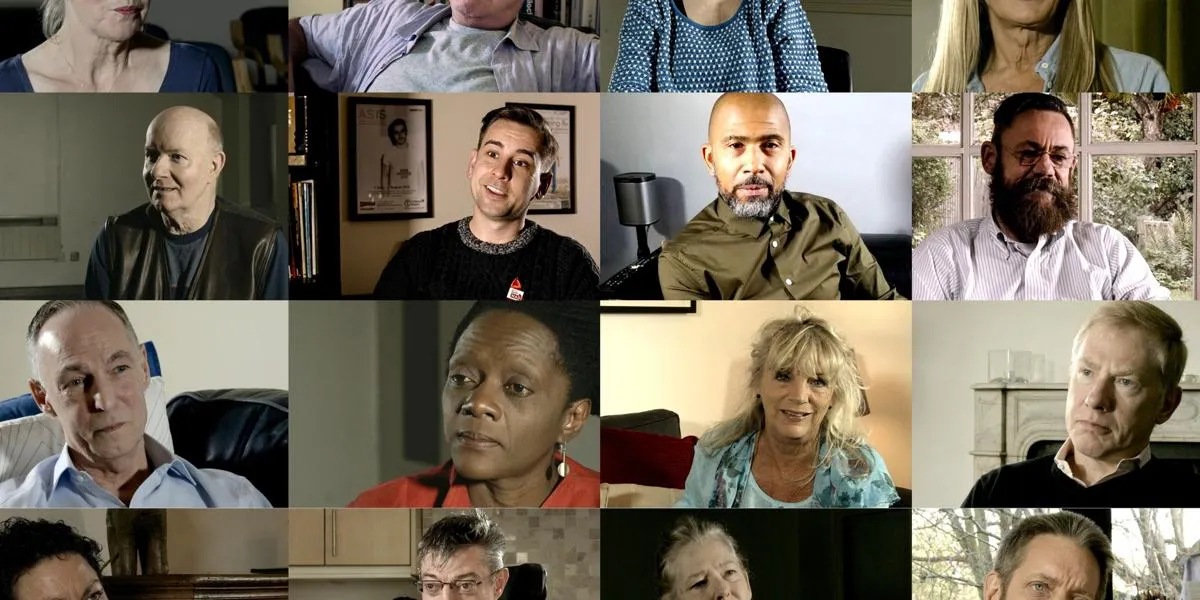Positive History Project

In May 2020 The London Archives was awarded a substantial grant by the Wellcome Trust, through its Research Resources in Medical History scheme, for a project entitled Positive history: preserving the archives of HIV/AIDS: care and testimony.
Positive History
The aim of the project was to make accessible three recently acquired archive collections held by The London Archives which together illuminate two important threads of the AIDS crisis of the 1980s and its aftermath: pioneering medical treatment, care and support; and lived experience of not only those diagnosed with HIV/AIDS, but their carers, partners, relatives and friends.
They comprise:
- 103 interviews of people with AIDS, their families, partners and carers, filmed by the National HIV Story Trust (NHST)
- The Mildmay Hospital archive including 4000 patient case files
- The archive of peer-led support charity Positively UK (formerly Positively Women)
The National HIV Story Trust archive
The National HIV Story Trust (NHST) was set up to film, record and preserve the history of those affected by the HIV/AIDS epidemic of the 1980s and 1990s. The intention of the charity is to produce a documentary based on the interviews they record, and to date they have deposited 103 full-length recordings with The London Archives documenting the lived experience of the epidemic, to be preserved for future generations and developed as an education resource for schools, colleges, and other interested parties.
The interviews provide first-hand accounts of living with HIV through the early years of the epidemic, including experience of medical and community HIV care and support, and draw on the testimony of people living with HIV, carers, partners, relatives, friends, and healthcare practitioners. Many of the interviewees recount the loss of partners and loved ones, and reflect on bereavement, loss and the trauma of those years, but also express the love, friendship and solidarity that was shared, as well as laugh-out-loud anecdotes.
The interviews, which amount to over 150 hours of harrowing, shocking and insightful footage from interviewees who agreed to publicly share their experiences, include primarily members of the LGBTQ+ community, but also heterosexual people, haemophiliacs infected with contaminated blood, as well as doctors, nurses and other healthcare professions and activists.
Meticulously catalogued, transcribed, digitally edited and sensitivity-reviewed by the Positive History project team, the interviews are available for researchers to consult in the Mediatheque at The London Archives.
The Mildmay Hospital archive
The origins of the Mildmay Mission Hospital date back to 1866 when the vicar of St. Jude, Islington and deaconesses from the Mildmay Mission began to care for the sick and their dependents in East London during a cholera outbreak. The work of the deaconesses subsequently expanded and in 1892 Mildmay Mission Hospital opened, becoming a part of the National Health Service in 1948. However, as a hospital with less than 200 beds, over time it was regarded as uneconomic and was closed in 1982. The closure was strongly protested against and in 1988 it reopened as Europe’s first hospice caring for people with AIDS-related illnesses. As medication developed and need changed, Mildmay quickly adapted its focus from end-of-life care to specialist assessment and rehabilitation.
Today Mildmay is an internationally recognised pioneer of specialist HIV service delivery and care. In 2014 a new purpose-built hospital was opened in East London, close to where Mildmay’s original work began. The archives comprise the corporate records of the hospital including minutes, reports, publications, newsletters, photographs and examples of work produced by patients during art therapy sessions, alongside case files for deceased patients with AIDS-related illnesses.
The case files of patients are not available for general access due to the sensitive personal information they contain, often not only regarding the patient but also those close to them. However, in recognition of the files as a rich and invaluable source for documenting the development of treatment and care of people with HIV and AIDS-related illnesses, the project created a searchable database by extracting information from each file. The extracted information includes (but is not limited to) name of patient, date of diagnosis, medical conditions and illnesses, medication regimes, social situation and reason for admission. The database is available to researchers on request, please contact us to request access.
The Positively UK archive
Positively UK was founded in 1987 by two women living with HIV who found that there were no peer led support services for women. They started the organisation by placing hand drawn posters at clinics inviting other women to meet in their living room. Initially only aimed at women, over time new communities turned to the organisation for support. Sitting alongside its peer led support services is its campaigning and policy work to improve services and care for people living with HIV.
The archives comprise photographs, annual reports, newsletters, magazines and other publications demonstrating the breadth of the activity and the reach of its work from 1980 to date. These records have now been catalogued and are available to research on our catalogue and to use at The London Archives.
The cataloguing of these records also facilitated a number of workshops at The London Archives in collaboration with Positively UK and the Royal Central School of Speech and Drama (RSSD) which aimed to support women living with HIV in exploring and interrogating the archive and, alongside students from the University, using the archive as an inspiration to produce new writing and performance and to develop material and ideas.